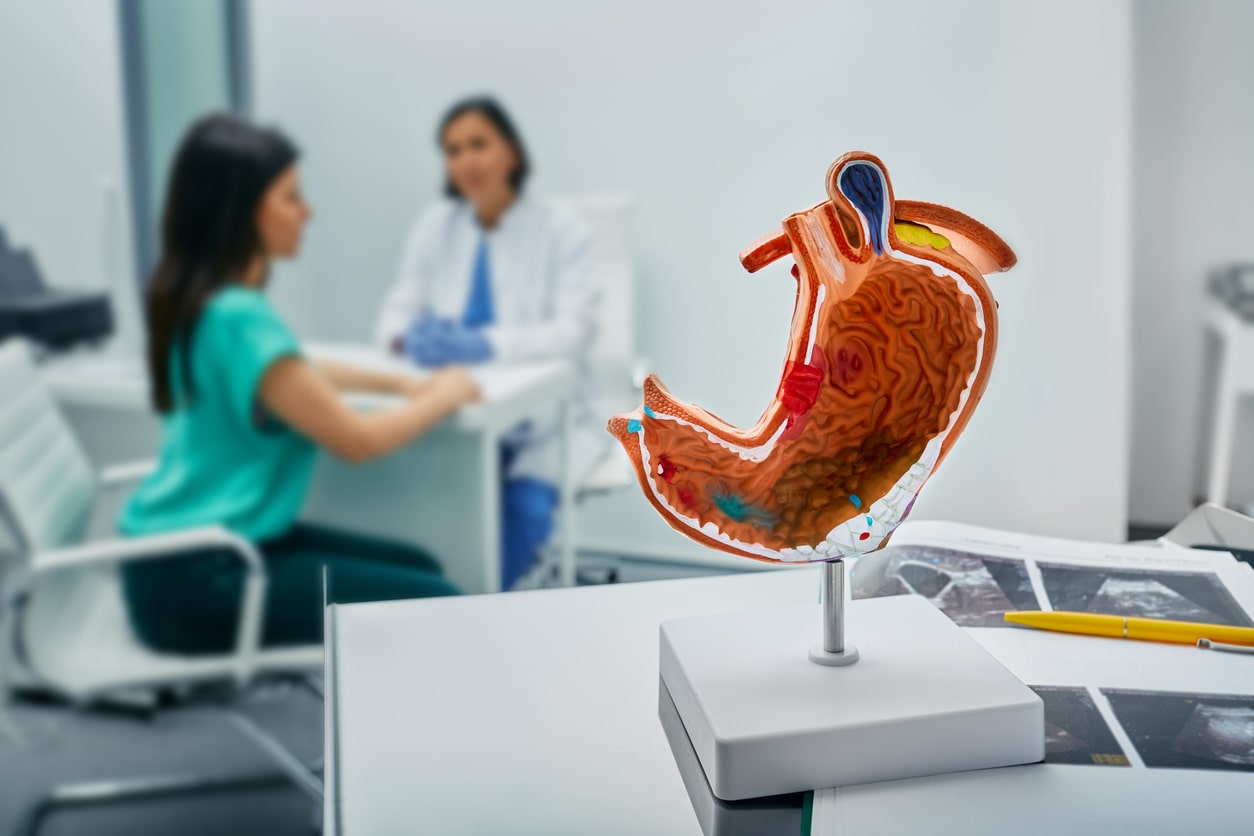
What is a GI Doctor?
A GI doctor, or gastroenterologist, is a medical specialist focused on diagnosing and treating issues related to the digestive system. From common problems like acid reflux and irritable bowel syndrome to more complex conditions such as Crohn’s disease and liver disorders, GI doctors play a crucial role in maintaining digestive health. If you’re dealing with chronic stomach pain, persistent discomfort, or unexplained changes in digestion, understanding what a GI doctor does can help you know when it’s time to seek their expert care.
Areas of Expertise
A gastroenterologist is an expert in a variety of areas related to digestive health. Their expertise spans a wide range of conditions and treatments, including:
- Acid Reflux, GERD, and IBS: Diagnosis and treatment of conditions like heartburn, gastroesophageal reflux disease, and irritable bowel syndrome.
- Inflammatory Bowel Diseases (IBD) and Celiac Disease: Management of chronic conditions such as Crohn’s disease, ulcerative colitis, and celiac disease.
- Liver, Gallbladder, and Pancreas Disorders: Care for liver diseases (hepatitis, cirrhosis), gallbladder issues (gallstones), and pancreatic conditions (pancreatitis).
- Gastrointestinal Cancers: Diagnosis and management of cancers affecting the digestive system, including colorectal, esophageal, and stomach cancers.
- Endoscopic Procedures and Digestive Infections: Performing diagnostic procedures like colonoscopies and endoscopies, and treating infections caused by bacteria, viruses, or parasites.

When to See a Gastroenterologist
Knowing when to see a gastroenterologist is important for your digestive health. Addressing issues early can help prevent serious problems down the road. If you notice any of the following symptoms, it’s time to make an appointment:
- Chronic Heartburn or Acid Reflux: Frequent heartburn or acid reflux that doesn’t go away with over-the-counter medicine could be a sign of a condition like GERD (gastroesophageal reflux disease).
- Persistent Abdominal Pain: If you’re having ongoing stomach pain, cramping, or bloating that doesn’t improve, it could point to digestive issues like irritable bowel syndrome (IBS) or other conditions.
- Unexplained Weight Loss: Losing weight without trying or for no clear reason might suggest a problem like malabsorption or even a more serious issue such as Crohn’s disease or cancer.
- Blood in Stool or Vomit: Seeing blood in your stool, vomit, or noticing black, tarry stools could mean there’s bleeding in your digestive tract, which needs to be checked out.
- Difficulty Swallowing: If it’s hard to swallow food or liquids, it could be a sign of problems in the esophagus or throat, such as swallowing disorders or even cancer.
- Changes in Bowel Habits: Having changes in bowel movements, such as long-term diarrhea or constipation, may indicate an infection or digestive condition that needs attention.
- Age and Routine Screenings: If you’re over 45, it’s a good idea to start regular screenings, like a colonoscopy. Colon cancer is more common as we age, and having regular screenings can catch problems early.
If you notice any of these symptoms, don’t wait. Seeing a gastroenterologist early can help prevent bigger issues later on. Gastroenterology of Greater Orlando is here to serve you and give you back your health.
What to Expect During Your Visit to a Gastroenterologist
When you visit a gastroenterologist, the doctor will begin by discussing your medical history, including any past digestive issues, current symptoms, and family history. They’ll also ask about your diet, lifestyle, and medications.
Your doctor may perform a physical exam to check for tenderness or swelling in your abdomen. Depending on your symptoms, they might recommend tests such as blood work, imaging scans, or procedures like endoscopy or colonoscopy. If tests are needed, your doctor will explain them and help you prepare.
You’ll also receive advice on managing your condition, like diet changes or medications, and your doctor will answer any questions you have about your next steps.

How Gastroenterologists Diagnose and Treat Digestive Disorders
Gastroenterologists use several tests to diagnose digestive issues, including colonoscopies, endoscopies, and imaging tests like CT scans and MRIs. These help them identify problems such as cancer, inflammation, or blockages in the digestive tract.
Treatment varies depending on the condition. Medications can manage symptoms like acid reflux, IBS, or liver disease. In some cases, procedures like dilation or stent placement can treat blockages without surgery. For more serious issues, like inflammatory bowel disease or tumors, surgery or advanced treatments may be needed.
Preventative Care and Screening
Gastroenterologists focus on preventing problems and detecting them early. Regular screenings are important for spotting gut issues before they become serious. Here are some key screenings to keep in mind:
- Colonoscopy: This screening looks for colorectal cancer and is usually recommended for people over 45, or younger if there’s a family history of the disease.
- Upper Endoscopy (EGD): This procedure checks the esophagus, stomach, and duodenum for problems like ulcers, acid reflux, and early signs of cancer.
- Hepatitis Screenings: Blood tests that can detect hepatitis B and C, which can harm the liver if left untreated.
- Stool Tests: These tests look for hidden blood or abnormalities in the stool, helping to screen for colorectal cancer.
- Preventive Counseling: Your gastroenterologist will also give advice on diet, lifestyle, and medications to help prevent conditions like acid reflux, ulcers, and liver disease.
By having these screenings and taking preventive steps, you can catch problems early and keep your digestive health on track.
Pediatric Gastroenterology
Pediatric gastroenterology is a specialty that focuses on diagnosing and treating digestive problems in children, from infants to teens. Pediatric gastroenterologists treat common issues like acid reflux, constipation, and food allergies, as well as more serious conditions like inflammatory bowel disease (IBD) and liver disorders.
Talk to our team about the pediatric gastroenterology services we offer and how we can help your child’s digestive health. We work closely with parents and caregivers, offering guidance on how to manage the child’s condition. This ensures that children receive the right care for their age and individual needs.

Contact Us for GI Care
If you’re experiencing chronic digestive issues, need screenings, or require specialized care for complex conditions, our team is here to help.
At Gastroenterology of Greater Orlando, our skilled and compassionate GI doctors are committed to providing outstanding care. Reach out to us today to schedule an appointment and take the first step toward better digestive health.